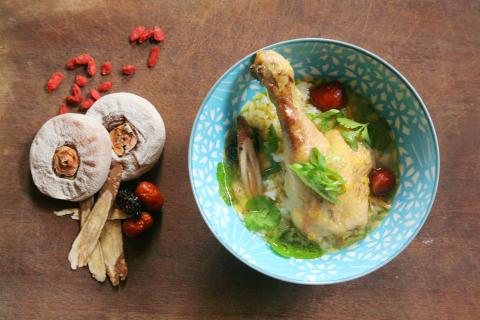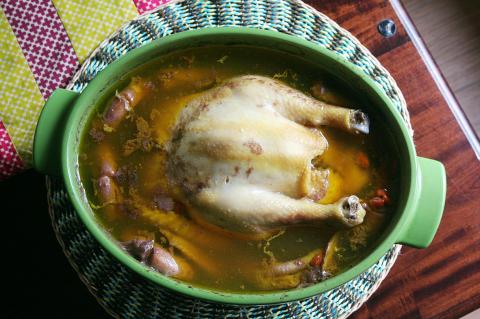Persimmons are one of the glories of Taiwan and the fresh fruit is in season from September through to November. The high regard that this fruit is held in around the world is reflected in such extravagant names as Jove’s fruit, fruit of the gods and Nature’s candy. As delicious as the fresh fruit is, arguably even better, and certainly a welcome extension to the period when one can enjoy the flavor of persimmons, are the dried fruit, call shibing (柿餅), dark puck-like disks dusted with a fine frosting of natural fruit sugar.
The center of shibing production is the township of Hsinpu (新埔) in Hsinchu County (新竹), where the dry climate and northeasterly autumn wind (九降風) provides an optimal environment for gradually drying the fruit through the effects of wind and sun. The dried persimmons are available year round, but the freshly made product can be found most abundantly in traditional markets from September through February. They taste fantastic on their own, the flesh of the fruit reduced to a dense perfumed jelly, and are a perfect accompaniment to a steaming cup of green tea, and make an interesting addition to a cheeseboard.
There are those who will necessarily chime in that nothing compares to the artisanal hoshigaki (dried persimmons) made in Japan from fresh Hachiya persimmons, which are renowned for their softness, but are both expensive and difficult to obtain — even in Japan. Shibing are made from orb shaped “stone” persimmons (石柿), the main type of persimmon cultivated in Hsinchu and distinct from the better known Bull Heart persimmon (牛心柿), the most widely cultivated in Taiwan and the Shy Jou (四周柿), both primarily eaten fresh.

Photo: Ian Bartholomew
The key element of a quality shibing is the white bloom (柿霜), a dusting of sugar that forms on the outside of the fruit as it dries. Always distrustful of processed foods, I once thought that this dusting was icing sugar or some other artificial way of sweetening the fruit, but it is wholly natural, and indeed good quality shibing should have no additives whatsoever.
While the outer skin of the shibing is tougher than that of hoshigaki, there are a wide variety of applications for which this does not matter at all, and in terms of taste, shibing can go head-to-head with the more exulted Japanese version.
The health benefits of persimmons are so extensive that I hesitate even to mention them in case the long list of vitamins and minerals puts people off. It is positively stuffed to bursting with good things including vitamins A, C, E and B6, as well as dietary fiber, manganese, copper, magnesium, potassium and phosphorous, as well as beneficial organic compounds such as “atechins, gallocatechins, betulinic acid, and various carotenoid compounds that fall within the B complex of vitamins.” The Organic Facts Web site (www.organicfacts.net/health-benefits/fruit/persimmons.html), which provides the above quote, adds that these elements contribute to the persimmon’s ability to help prevent cancer, boost the immune system, and help digestion. It has anti-tumor and anti-aging properties, has benefits for eye health and is good for regulating blood pressure. It does not quite bestow eternal life, but it seems to be getting close.

Photo: Ian Bartholomew
But all that aside, it simply tastes brilliant, and in addition to serving as a tea snack, can provide a great twist on meat dishes, as in the accompaniment recipe.
Duck and orange, pork and apple, are great classics. Wet rice with persimmon chicken soup, a traditional though not widely seen combination, proves that persimmon and chicken is another culinary match made in heaven. As the chicken is crucial to giving the soup its flavor, I strongly recommend using a good local chicken from a traditional market. The dates, wolfberry (枸杞) and astragalus (黃耆) are best obtained from a Chinese medicine shop where they will be happy to supply you with the small quantities required.
Shibing can be kept for a month or more in the fridge (though they may become a little leathery) and will retain their flavor for a year or more kept in the freezer.
Recipe (serves six)
Wet rice with persimmon chicken soup
Ingredients
1 good quality local chicken
6 dried persimmons (shibing, 柿餅)
10 dried Chinese red dates (紅棗)
10 dried Chinese black dates (黑棗)
20 Chinese wolfberries (枸杞)
10g astragalus (黃耆)
20g ginger, thinly sliced (optional)
Cooked white rice
Spring onions, finely sliced
Coriander leaves
Directions
1. Wash the chicken and chop off feet, head, neck and wing tips.
2. Bring a large pot of water to a boil. Immerse the chicken in the water and bring back to a boil. Remove the chicken.
3. Place the persimmons, dates, astragalus, wolfberries, and ginger (if using) to a large casserole with a heavy lid. Put in the chicken in breast side up and fill with water to immerse the chicken. (It doesn’t matter if not completely immersed.) The feet, wing tips and neck (skin removed) can all be added to the broth to add flavor and body.
4. Bring to a boil over medium heat then turn heat to low and cover. Cook at a low simmer for about one hour.
5. Break up the chicken and serve over white rice with plenty of broth. Top with shredded spring onion and coriander leaf.
Ian Bartholomew runs Ian’s Table, a small guesthouse in Hualien. He has lived in Taiwan for many years writing about the food scene and has decided that until you look at farming, you know nothing about the food you eat. He can be contacted at Hualien202@gmail.com.

It’s a good thing that 2025 is over. Yes, I fully expect we will look back on the year with nostalgia, once we have experienced this year and 2027. Traditionally at New Years much discourse is devoted to discussing what happened the previous year. Let’s have a look at what didn’t happen. Many bad things did not happen. The People’s Republic of China (PRC) did not attack Taiwan. We didn’t have a massive, destructive earthquake or drought. We didn’t have a major human pandemic. No widespread unemployment or other destructive social events. Nothing serious was done about Taiwan’s swelling birth rate catastrophe.

Words of the Year are not just interesting, they are telling. They are language and attitude barometers that measure what a country sees as important. The trending vocabulary around AI last year reveals a stark divergence in what each society notices and responds to the technological shift. For the Anglosphere it’s fatigue. For China it’s ambition. For Taiwan, it’s pragmatic vigilance. In Taiwan’s annual “representative character” vote, “recall” (罷) took the top spot with over 15,000 votes, followed closely by “scam” (詐). While “recall” speaks to the island’s partisan deadlock — a year defined by legislative recall campaigns and a public exhausted

In the 2010s, the Communist Party of China (CCP) began cracking down on Christian churches. Media reports said at the time that various versions of Protestant Christianity were likely the fastest growing religions in the People’s Republic of China (PRC). The crackdown was part of a campaign that in turn was part of a larger movement to bring religion under party control. For the Protestant churches, “the government’s aim has been to force all churches into the state-controlled organization,” according to a 2023 article in Christianity Today. That piece was centered on Wang Yi (王怡), the fiery, charismatic pastor of the

Hsu Pu-liao (許不了) never lived to see the premiere of his most successful film, The Clown and the Swan (小丑與天鵝, 1985). The movie, which starred Hsu, the “Taiwanese Charlie Chaplin,” outgrossed Jackie Chan’s Heart of Dragon (龍的心), earning NT$9.2 million at the local box office. Forty years after its premiere, the film has become the Taiwan Film and Audiovisual Institute’s (TFAI) 100th restoration. “It is the only one of Hsu’s films whose original negative survived,” says director Kevin Chu (朱延平), one of Taiwan’s most commercially successful